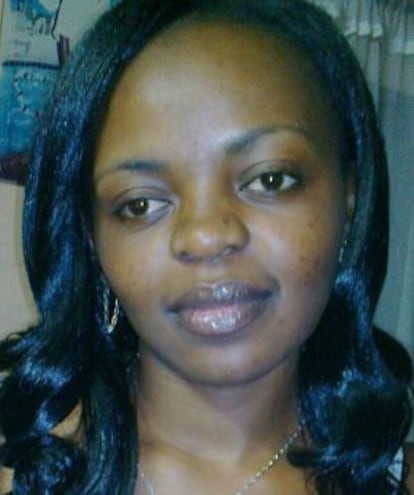Spain denies asylum to lesbian fleeing persecution in Cameroon
Petitioner was stopped with fake ID at Madrid airport, where she has been held for 23 days


Christelle Nangnou has spent the last 23 days at Madrid’s Barajas airport, inside a room for people who have been denied access to Spanish territory.
The 29-year-old fled her native Cameroon because her life was in danger. Her crime: being a lesbian.
Nangnou flew to Spain and sought asylum there, but the Interior Ministry turned down her request. She then turned to the European Court of Human Rights in Strasbourg, which has temporarily halted her deportation order.
Now, Nangnou is waiting for the European court’s final decision, due on Friday.
“I don’t feel good at all. I am alone,” she whispers in a telephone conversation.
In Cameroon, homosexuality is punished with prison terms ranging anywhere from six months to five years, and there have been documented cases of lynching attempts.
We think this is terrible. The risk to her life is more than evident”
Jesús Generelo, FELGTB president
Nangnou decided to flee when she found out that the police were after her. Her photograph was published in the local media under a headline that read: “Wanted: the leader of a group of lesbians.”
Her flight took her to Nigeria first, then to Madrid. But she was carrying fake identification papers.
“At the airport they saw that the ID wasn’t mine, and that’s why I’m here,” she confessed.
Her lawyer, Eduardo Gómez, explains that the ministry turned down her asylum request because it didn’t believe her story of persecution.
“At first she did not produce the newspaper clipping because she did not have a copy with her. Besides, her story does not sound very believable because she hesitates a lot when she tells it, but that’s normal,” adds Gómez. “In Cameroon, homosexuality is persecuted harshly and it is not easy for her to discuss her sexual orientation.”
After the first refusal, Nangnou’s defense attorney filed an appeal with the High Court and asked for a stay on the deportation order until a decision was returned. But this request was denied.
Finally, help came in the form of a temporary freeze on her expulsion orders, courtesy of Strasbourg.
The last time they tied my hands and threw me on the ground, I could not breathe”
Nangnou says that authorities at Madrid-Barajas Airport tried to put her on a plane to Cameroon on four different occasions.
“The last time they tied my hands and threw me on the ground, I could not breathe,” she says.
The Spanish Federation of Lesbians, Gays, Transexuals and Bisexuals (FELGTB) has taken up her cause and collected nearly 50,000 signatures in 24 hours to request that Nangnou be allowed to stay.
“We think this is terrible. The risk to her life is more than evident,” says Jesús Generelo, the federation president.
“It gives me hope. Every day I pray for my request to be accepted,” says Nangnou, grateful about the media repercussion.
On March 30, the Strasbourg court halted the deportation of another woman from Cameroon who had been the victim of an arranged marriage and domestic abuse.
Tu suscripción se está usando en otro dispositivo
¿Quieres añadir otro usuario a tu suscripción?
Si continúas leyendo en este dispositivo, no se podrá leer en el otro.
FlechaTu suscripción se está usando en otro dispositivo y solo puedes acceder a EL PAÍS desde un dispositivo a la vez.
Si quieres compartir tu cuenta, cambia tu suscripción a la modalidad Premium, así podrás añadir otro usuario. Cada uno accederá con su propia cuenta de email, lo que os permitirá personalizar vuestra experiencia en EL PAÍS.
¿Tienes una suscripción de empresa? Accede aquí para contratar más cuentas.
En el caso de no saber quién está usando tu cuenta, te recomendamos cambiar tu contraseña aquí.
Si decides continuar compartiendo tu cuenta, este mensaje se mostrará en tu dispositivo y en el de la otra persona que está usando tu cuenta de forma indefinida, afectando a tu experiencia de lectura. Puedes consultar aquí los términos y condiciones de la suscripción digital.








































